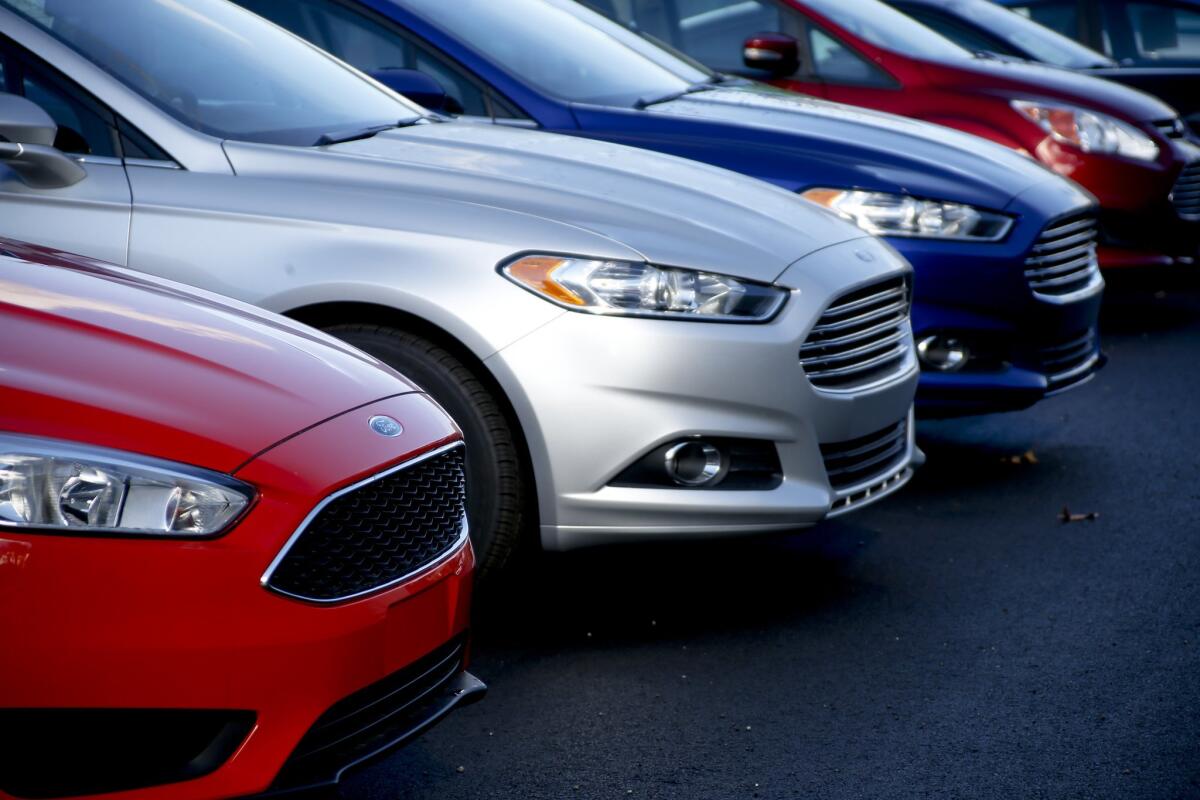U.S. auto sales report big numbers, best month in 10 years

Ford, Nissan and
- Share via
Ford, Nissan and Fiat Chrysler each reported big U.S. sales gains in March as the auto industry appeared to be headed for its best month in more than a decade.
Even General Motors, which has been cutting back on sales to rental car companies, saw a slight sales increase and said its retail sales to individual buyers rose 6 percent.
The increases showed that Americans are still buying cars and trucks in big numbers, despite predictions by some analysts and dealers that sales have peaked.
Mustafa Mohatarem, GM’s chief economist, said the U.S. economy remains strong, and that should help auto sales to continue to lead the recovery from recession. “We expect historically low interest rates, strong employment, rising wages and stable fuel prices to continue for the foreseeable future,” Mohatarem said in a statement.
Nissan sales were up 13 percent, hitting a record for any month in its history. At Fiat Chrysler and Ford, sales were up 8 percent, while they grew 0.9 percent at General Motors. Ford and Fiat Chrysler posted their best March numbers in a decade.
Industry analysts expect March sales to rise 7 percent to 8 percent over a year ago by the time automakers finish reporting numbers on Friday. Kelley Blue Book says sales should total around 1.66 million cars and trucks for the month, which could be the biggest number for any month since July of 2005.
Relatively low gas prices, sweet lease deals, low interest rates, easy-to-get loans and an aging fleet of cars are driving the increase.
But some analysts say there are troubling signs for automakers beneath the numbers. Last month had two more selling days than a year ago, and spending on discounts is on the rise. Also increasing are low-profit sales to rental car companies, which some automakers use to boost their numbers.
Discount spending, while good for new-car buyers, cuts profits and hurts used car values. High incentive spending is one of the factors that led to the industry’s financial troubles in 2008. The auto pricing site TrueCar.com said automakers averaged just over $3,000 in discounts per vehicle in March, up more than 10 percent from a year ago.
The increase comes mainly because automakers are having trouble selling cars as the U.S. market shifts to trucks and SUVs, according to J.D. Power and Associates. Discounted cars can push down used car values so buyers have less to trade in, said Thomas King, a J.D. Power vice president. “Significant declines in the value of used cars would disrupt consumers’ ability to buy new vehicles,” King said in a statement.
Incentive spending last month rose toward recession-era levels, King said. Discounts on cars grew to 12.3 percent of the manufacturer’s sticker price last month, but truck and SUV discounts stayed stable at 8.2 percent.
At Fiat Chrysler, car sales fell 34 percent for the month, but truck and SUV sales rose 23 percent. The company sold 34,780 cars and 178,407 SUVs.
Some analysts have predicted that U.S. auto sales will reach a peak this year, but Jeff Schuster, senior vice president of forecasting for the LMC Automotive consulting firm, said the March numbers show there’s still room for growth.
“We’re not necessarily seeing weakness,” he said. “We’re just seeing slower growth.”
LMC is forecasting sales of 17.8 million vehicles this year, up 1.9 percent from the 2015 record of 17.5 million. Last year sales grew by nearly 6 percent over 2014.






